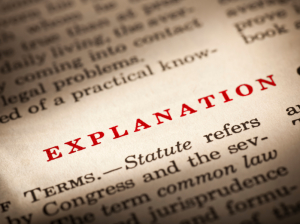What is a consent judgment and why is it bad in a collection case?
You’re trying to figure out how to handle your collection case and you have been chatting with the collection lawfirm about settling. Then you get an envelope from the lawfirm with a piece of paper with the title, “Consent judgment.”
They collection lawyer says in a letter, “Just sign it, because you won’t have to show up to court if you do.”
What should you do?
First, let’s figure out what exactly a consent judgment is.
A consent judgment is where you allow the court to rule against you in your case.
This means that you, literally, agree to a judgment against yourself.
Sometimes collection lawyers, whether they’re being innocent or not, will say, “Oh, it’s no big deal. We’re not going to garnish you, and it’s not even a real judgment.”
Wrong.
A judgment is a judgment.
They may not garnish you, however they do expect you to continue making consistent payments to the collection firm.
Also, the credit reporting agencies will keep that judgment on your credit report.
At that point, the collection lawyer has no control over that. You see, the credit reporting agencies pick up the public records directly and report them. There will be a judgment and that gets reported. Whether it is a default judgment, a judgment after a trial, or a consent judgment — they are all reported as judgments.
Because of these issues, a consent judgment is rarely the way to go in a collection lawsuit.
This is a real judgement that messes up your credit report.
For most people, this is a bad choice to make in their collection case.
There are very few cases where it’s appropriate to agree to a consent judgment.
At Watts & Herring, I can think of one time our client agreed to a consent judgment many years ago. For that one client it made sense but it was very unusual.
When we deal with collection lawyers, they know that we don’t do consent judgments.
Make sure you think about this before you agree to a consent judgment.
Do you really want a judgment against you?
If you do miss one of the payments they’re expecting, they can garnish you.
(Which is fair in some ways, because you agreed to make those payments when you signed the judgment.)
The worst part of this is having it on your credit report.
There are better ways to handle a collection lawsuit.
If you’re dealing with a debt collector, it may not even be a good idea to settle with this collection agency.
You may need to fight the collection lawsuit on your own.
Or, if you haven’t hired an attorney already, hire us to fight it for you and make this lawsuit go away.
You can review your five options when sued here in this article and video and we’ll be happy to talk to you to go over your options.
Feel free to contact us.
If you have any questions about what we’ve covered in this article, feel free to get in touch with us.
You can call us at 1-205-879-2447 and ask for Carolyn, or you can fill out a contact form and we will gladly set up a phone call or meeting.
I look forward to talking with you soon!
Have a great day.

I was served by a collection attorney and they are telling me the only way they can give me a lower payment is to sign a consent of judgement. I am now considered disable with a non-curable medical condition.
Tarrah,
Settlement is entirely voluntary for both sides. So the collection attorney can say “We won’t lower the payments without a consent judgment” and then you have to decide if you are willing to accept this or not.
I would get with a lawyer in your state to find out if there is risk to your property, etc. in this lawsuit. If not, then you may not want to agree — instead take your chances at trial.
If you are in Alabama call us at 205-879-2447 or if outside of Alabama start here — https://www.consumeradvocates.org/find-an-attorney
Best wishes!
John Watts